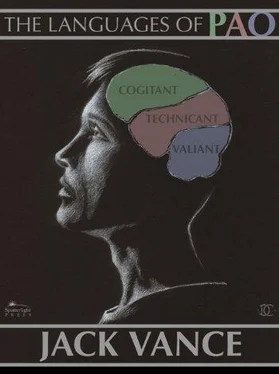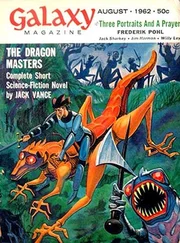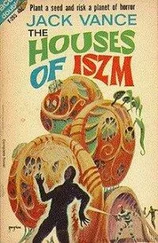“If you wish an effective fighting force,” said Palafox, “here is the only means to that end. There is no short-cut.”
Bustamonte looked away, out over the Wind River. “You believe that this fighting force can be created?”
“Certainly.”
“And how much time might be required?”
“Twenty years, more or less.”
“Twenty years!”
“We must begin with children, with babies.”
Bustamonte was silent several minutes. “I must think this over.” He jumped to his feet, strode back and forth shaking his hands as if they were wet.
Palafox said with a trace of asperity: “How can it be otherwise? If you want a fighting force you must first create fighting spirit. This is a cultural trait and cannot be inculcated overnight.”
“Yes, yes,” muttered Bustamonte. “I see that you are right, but I must think.”
“Think also on a second matter,” Palafox suggested. “Pao is vast and populous. There is scope not merely for an effective army, but also a vast industrial complex might be established. Why buy goods from Mercantil when you can produce them yourself?”
“How can all this be done?”
Palafox laughed. “That is where you must employ my special knowledge. I am Dominie of Comparative Culture at Breakness Institute.”
“Nevertheless,” said Bustamonte obstinately, “I still must know how you propose to bring about these changes—never forgetting that Paonese resist change more adamantly than the advent of death.”
“Exactly,” replied Palafox. “We must alter the mental framework of the Paonese people—a certain proportion of them, at least—which is most easily achieved by altering the language.”
Bustamonte shook his head. “This process sounds indirect and precarious. I had hoped …”
Palafox interrupted incisively. “Words are tools. Language is a pattern, and defines the way the word-tools are used.”
Bustamonte was eyeing Palafox sidelong, his expression suggesting that he considered the dominie no more than an impractical academician. “How can this theory be applied practically? Do you have a definite detailed plan?”
Palafox inspected Bustamonte with scornful amusement. “For an affair of such magnitude? You expect miracles even a Breakness Wizard cannot perform. Perhaps you had best continue with the tribute to Eban Buzbek of Batmarsh.”
Bustamonte was silent.
“I command basic principles,” said Palafox presently. “I apply these abstractions to practical situations. This is the skeleton of the operation, which finally is fleshed over with detail.”
Bustamonte still remained silent.
“One point I will make,” said Palafox, “that such an operation can only be effectuated by a ruler of great power, one who will not be swayed by maudlin sentiment.”
“I have that power,” said Bustamonte. “I am as ruthless as circumstances require.”
“This is what must be done. One of the Paonese continents—or any appropriate area—will be designated. The people of this area will be persuaded to the use of a new language. That is the extent of the effort. Presently they will produce warriors in profusion.”
Bustamonte frowned skeptically. “Why not undertake a program of education and training in arms? To change the language is going far afield.”
“You have not grasped the essential point,” said Palafox. “Paonese is a passive, dispassionate language. It presents the world in two dimensions, without tension or contrast. A people speaking Paonese, theoretically, ought to be docile, passive, without strong personality development—in fact, exactly as the Paonese people are. The new language will be based on the contrast and comparison of strength, with a grammar simple and direct. To illustrate, consider the sentence, ‘The farmer chops down a tree.’{Literally rendered from the Paonese in which the two men spoke, the sentence was: ‘Farmer in state of exertion; axe agency; tree in state of subjection to attack. ’ the italicized words denoting suffixes of condition.} In the new language the sentence becomes: ‘The farmer overcomes the inertia of the axe; the axe breaks asunder the resistance of the tree.’ Or perhaps: ‘The farmer vanquishes the tree, using the weapon-instrument of the axe.’ ”
“Ah,” said Bustamonte appreciatively.
“The syllabary will be rich in effort-producing gutturals and hard vowels. A number of key ideas will be synonymous; such as ‘pleasure’ and ‘overcoming a resistance’—‘relaxation’ and ‘shame’—‘out-worlder’ and ‘rival’. Even the clans of Batmarsh will seem mild compared to the future Paonese military.”
“Yes, yes,” breathed Bustamonte. “I begin to understand.”
“Another area might be set aside for the inculcation of another language,” said Palafox off-handedly. “In this instance, the grammar will be extravagantly complicated but altogether consistent and logical. The vocables would be discrete but joined and fitted by elaborate rules of accordance. What is the result? When a group of people, impregnated with these stimuli, are presented with supplies and facilities, industrial development is inevitable.
“And should you plan to seek ex-planetary markets, a corps of salesmen and traders might be advisable. Theirs would be a symmetrical language with emphatic number-parsing, elaborate honorifics to teach hypocrisy, a vocabulary rich in homophones to facilitate ambiguity, a syntax of reflection, reinforcement and alternation to emphasize the analogous interchange of human affairs.
“All these languages will make use of semantic assistance. To the military segment, a ‘successful man’ will be synonymous with ‘winner of a fierce contest’. To the industrialists, it will mean ‘efficient fabricator’. To the traders, it equates with ‘a person irresistibly persuasive’. Such influences will pervade each of the languages. Naturally they will not act with equal force upon each individual, but the mass action must be decisive.”
“Marvellous!” cried Bustamonte, completely won over. “This is human engineering indeed!”
Palafox went to the window and looked across Wind River. He was faintly smiling and his black eyes, usually so black and hard, were softly unfocused. For a moment his real age—twice Bustamonte’s and more—was apparent; but only for a moment, and when he swung about, his face was as emotionless as ever.
“You understand that I merely talk at random—I formulate ideas, so to speak. Truly massive planning must be accomplished: the various languages must be synthesized, their vocabularies formulated. Instructors to teach the languages must be recruited. I can rely on my own sons. Another group must be organized, or perhaps derived from the first group: an elite corps of coordinators trained to fluency in each of the languages. This corps will ultimately become a managerial corporation, to assist your present civil service.”
Bustamonte raised his eyebrows, blew out his cheeks. “Well … possibly. So far-reaching a function for this group seems unnecessary. Enough that we create a military force to smite Eban Buzbek and his bandits!”
Bustamonte jumped to his feet, marched back and forth in excitement. He stopped short, looked slyly toward Palafox. “One further point we must discuss: what will be the fee for your services?”
“Four brood of women a month,” said Palafox calmly, “of optimum intelligence and physique, between the ages of fourteen and twenty-four years, their time of indenture not to exceed fifteen years, their transportation back to Pao guaranteed, together with all substandard and female off-spring.”
Bustamonte, with a knowing smile, shook his head. “Four brood—is this not excessive? Surely you cannot successfully breed sixty-four women a month?”
Читать дальше







